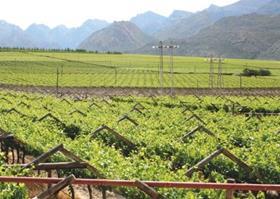
Article updated 09:00 GMT to correct cartons figure
South Africa's table grape business has been rocked by major strike action on the part of farm workers, who vented their anger over pay conditions by setting fire to around 30ha of vineyards near De Doorns, in the country's Hex River Valley.
Eurofruit understands the motivation for the protests is political, with more than one source suggesting they were timed deliberately to place pressure on the Democratic Alliance (DA) party, which governs the Western Cape.
Elections are due to take place in December to appoint new leaders of South Africa's ruling party the ANC, prompting many to speculate that labour groups are taking the opportunity to secure a better pay deal that might secure the DA's continued political support.
Following months of unrest in the country's mining industry, new pay demands have reportedly been tabled by union representatives in the past few days, potentially placing pressure on major agricultural and industrial employers, including fruit growers, in the country.
Harvesting of table grapes in the Hex River Valley is not due to begin until mid-January, so the impact on harvesting and exports is expected to be negligible, despite the obvious loss of fruit.
The protesters are understood to have walked along the side of one vineyard at De Doorns before setting light to an area of grass.
The flames subsequently spread to adjacent table grape vines but the incident, although shocking, will not lead to any major loss of production volume.
The Hex River Valley traditionally produces around 18m-19m tonnes of table grapes each year, while 30ha of land would typically yield about 5,000 cartons per hectare, roughly 150,000 cartons of the fruit and a miniscule proportion of the total crop.
Contract concerns
However, with contract negotiations continuing, growers are known to be concerned about the impact of new pay demands on the table grape industry, which is already committed to complying with minimum standards in terms of working conditions – often based on so-called 'piece work' contracts that allow employees to earn much more than the standard agreed rates.
Any agreement to increase significantly the salaries paid to those working in the table grape industry could have a detrimental effect on several growers, although they were said to be hopeful the situation would be resolved before too long.
'With Maersk Line already causing a headache for growers by upping their cargo rates, this will be a serious concern for grape growers in South Africa and could put a significant proportion of them at risk of bankruptcy, not to mention the rest of the fruit industry,' one source told Eurofruit.
Those involved in the Hex River Valley protest insisted a new pay deal had to be reached.
'The wages here are too small, R72 (€6.50) a day. You cannot buy anything with that money,' strike leader Shaun Janca told the Daily Maverick.
'You must talk to the farmers. The money that they pay us is nothing. We work our whole lives but still we have nothing. We are working for what? For what?'
Farm workers were said to be frustrated with the amount they were paid to help grow, harvest and export table grapes and citrus.
'The farmers make large sums of profit, but then there is no return for the workers,' local labour advisor Petrus Brink told The Guardian.
'The farm owners reason they don't have to bargain for farm labour because there is already a pool of cheap labour, and so if the permanent workers from the Western Cape don't want to work for that amount, the farmers do have access to another labour market.'






No comments yet